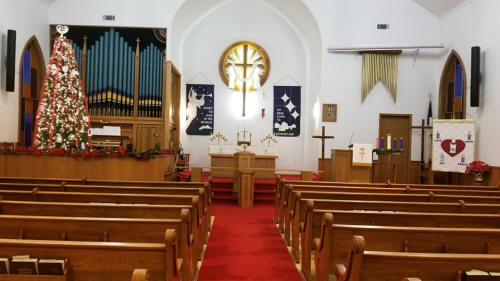|
Builder: Vogelpohl & Spaeth, Op. 43, 1905. Manuals: 2 Ranks: 10 Pipes: 576 Stops: 10 Action: Mechanical/slider chests Notes: Updated by John Panning, who has heard or played the organ. This organ was later moved to St. Paul's Lutheran Church in Malcolm, Nebraska. Shown in picture. In 1922 Immanuel moved from its 18th Avenue North/11th Street location to a new building at 2201 Girard Avenue N in Minneapolis. It appears the organ may have been moved before it was sold to the Nebraska congregation. Organ Historical Society as of 2020. Notes from Bedient, Sept. 2021:
Our crew has just completed the restoration of the pipe organ at
St. Paul Lutheran Church in Malcolm, NE. The organ was built in
1905 by the Vogelpohl & Späth company of New Ulm, Minnesota and
was originally installed at Immanuel Lutheran Church in
Minneapolis. That congregation built a new sanctuary in 1920
and traded this organ in for a new and larger instrument from
the same firm. When St. Paul completed their church building in
1921, this organ was available and ready to deliver. It was
installed in July of that year.
In the 1960s, it was decided that the elaborately stenciled
pipes were a distraction from worship so they were painted
black. Plywood paneling, also painted black, was installed to
cover the oak case. In the 1980s, they realized this was a
mistake and the facade pipes were repainted as you see them
today. The oak casework was also revealed and refinished.
In celebration of their 100th anniversary, the congregation
decided to have the organ restored. New stained glass windows
were also commissioned to replace the old, colored plexiglass
panels. The organ restoration work was comprehensive. The
Swell was nearly unplayable due to numerous cracks in the wind
chest table. The Great was not much better. Notes would "bleed
through" between one another. Wind loss was so great that all
stops sounded muted and colorless. It was nearly impossible to
tune. A new wind chest table of marine-grade mahogany plywood
will give many decades of trouble free service. The leaking
wind reservoir was releathered and gaskets were replaced
throughout the organ. The entire key action was cleaned,
re-bushed, and regulated. Stopped wooden pipes were releathered
and all the pipe work was cleaned and dents were removed. Other
components were repaired or replicated as necessary.
The action is now light and responsive. There is no longer the
constant hiss of wind leaks. Most importantly, the pipes all
speak with clarity and richness that hasn't been heard in
decades. Everyone on the Bedient crew is delighted to know that
this organ will be faithfully serving this congregation for
generations to come! More information and a stop list can be
found on the Organ Historical Society Website: https://www.pipeorgandatabase.org/organ/69161
A dedication recital will be scheduled at a later date.
|
 |
|
|
|